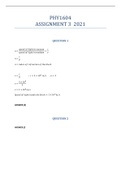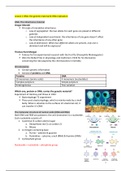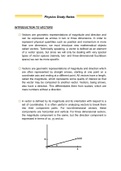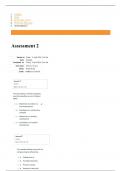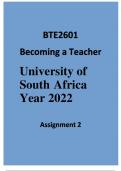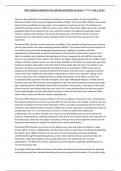SHAKESPEAR
- Tempest is an old English word for a violent storm
- Furious agitation, commotion or tumult, an uproar, angry, confused.
In the tempest Shakespear explores the efforts of humanity to achieve a better world through
virtuous government and just authority.
Like a tragedy it deals with a conflict between an induvial and environmental circumstance. In a
tragedy, the individual is overwhelmed and ultimately defeated. In a comedy, however, the
individual is triumphant.
3 plots:
1. Main plot: Prospero's desire of revenge
2. Subplot 1: Caliban, Stefano and Trinculo trying to assassinate Prospero
3. Subplot 2: the love affair (Miranda and Ferdinand)
- Colonialism/ power: A post-colonial reading of the play (particularly, relevant today
where there is such a strong focus on decolonization). This play was a critique of
colonialism. *Visionary – he was in the middle of colonialism but maybe his goal was to
destroy it. Visionaries aim to change, e.g., fight for equality.
- This play focuses on government and power. What constitutes virtuous power?
language is power, and characters use language to bless, curse, confuse, heal or
manipulate.
- Masters and servants: there are many relationships in the play which involve power and
servitude – Prospero and Caliban/ ariel; Alonso and the nobles. What does Shakespear
reveal about the effect of power.
*The tempest is thought to confront the question of the effects of colonization and civilization on
human nature.
- Revenge and forgiveness
- Magic, art and theatre: seeing the play as a comment about the nature and power of art
and theatre.
Sub themes:
− Justice: Prospero seeks justice for the wrong he has suffered.
− Fate and fortune: Prospero bring about a happy ending for most of the characters.
− Feminist play (to an extent – we will consider Claribel and Miranda, and how they are
treated).
,Prospero: Rightful duke of Milan.
Antonio: Prospero's brother and he usurps Prospero’s position as duke. Commented [zw1]: POSSIBLE ESSAY TOPIC:
machiavellian character:
Ariel: Prospero's agent (spirit who serves Prospero) - cunning, scheming, devious, especially in politics.
- focused solely on our interest
Caliban: Sycorax's son and Prospero's slave. - will exploit others for their own benefit
- indifferent to moral behaviour
Sub characters:
Miranda: daughter of Prospero
Alonso: King of Naples
Ferinand: Alonso’s son.
Sebastian: Alonso’s brother.
Gonzalo: Alonso's counsellor.
The relationship between Antonio and Prospero
The relation between Miranda and Prospero
Good introduction to scene because it opens with a spectacular tempest opens the play and the
conventual authority is overthrown. The scene begins in the middle of a crisis and we start to
pick up certain characteristics about character through what they say and how they treat people. Commented [zw2]: This ship is travelling from norther
Africa back to the Naples, Italy.
- Yarely – nimbly, diligently.
“Play the men” - be brave and don't have *womanish fears
“Do you not hear him? You mar our labour. Keep your cabins – you do assist the storm.” -
Boatswain is getting highly annoyed the courtiers (men of court) and says you’re interfering with
our efforts. He is even shouting at king Alonso and saying he is assisting the storm and making
it harder for us. The courtiers show far less patience with the situation than ‘the commoners’
(the boatswain, mariners and each other etc).
17: Gonzalo says boatswains must remember there's a king on board
18-25: Boatswain says that he is the only kings hope and therefore should listen to what he has
to say. The commoner is in charge because the king wouldn't know how to save himself.
,26-31: Gonzalo is referring to an old proverb that said if a man is born to be hanged, he will
never drown. He takes comfort in this because it makes him think they’ll survive. He addresses
fate and says if he is wrong. Hes afraid they are all going to die.
38-39: Calling someone a dog is a big insult. This is the first thing we hear from Sebastian and
our first impression is that he is complex because all the boatswain is trying to do is save them.
Although is he is better than Antonio.
48: the shipwreck is so terrible, that even the mariners with all their knowledge and experience
can only prayer for their safety, they can't do anything else.
50-51: Gonzalo is concerned about his king and that his primary objective throughout the play.
• When humanity survival is at stake, human being must prepare to change, even if its
they we treat others and behave around them. The necessity for human development
and the willingness to change are both stressed in the tempest from the start.
B.B.Q “When the sea is. Hence! What cares these roarers for the name of the king? To cabin;
silence! Trouble us not.” - the boatswain says the storm does not care who is on the ship, these
roaring waves have no regard or respect for the authority of the kings. Kings have power over
men but no one has power over nature.
Takes place solely on the island. The realism of scene 1 is called into question by the first lines
of scene 2.the supernatural is master of the real/ natural world.
Metatheatre
Part 1: lines 1-186
- This explains Prospero's background.
Scene 2: Part 1:
1-13: Miranda is well-educated and has the power of language. She is sympathetic and kind.
She’s reminding Prospero of his humanity.
BBQ: 1-2: “if by your art, my dearest father, you have put the wild waters in this roar, allay
them” - art is magic. Miranda has witnessed the shipwreck and the storm and Miranda says if
your magic caused the storm, then allay - calm the storm. This shows Prospero's ability and
extent of his magic, he can create such a terrible tempest that caused a terrible shipwreck —
show how powerful he is. Miranda is close with her father and admires him.
Line 3-5: - the way Miranda describe what she sees, helps the audience imagine it too.
Strategic on behalf of Shakespeare to remind us we are watching a play.
“Pitch” - the sky is pitch black. “Welkins” - heaven. ‘Fire” - lightning. Characters describe the
scene to imagine.
BBQ 5-6: “‘O, I have suffer’d with those that I saw suffer” - she feels empathy which shows her
character. She is sympathetic and noble. She is genuinely concerned about those in the
, shipwreck, she is more effected by it than Prospero. We are invited to feel how she feels, she
guides the audience how to feel - falls under the idea of. Meta theatre.
BBQ 10: “god of power” - Prospero's magic
Line 15: Prospero, country to what Miranda and what the audience believes, Prospero believes
no harm done.
BBQ: 17: “my dear one” - companion quote, he cares for companion.
BBQ: “my daughter, who art ignorant of what thou art” - she doesn’t know her heritage, she's 15
and doesn’t know her backstory. What has kept Prospero from telling her.
Line 19-21: he says she doesn’t know him and who she is
21-22: she is content with what she knows. There is a difference between satisfaction and
happiness.
“’Tis time” - Prospero has decided for Miranda to learn about who she is and who he is.
Prosperous is always in control
- “Lend thy hand” - its heavy, lengthy, needs help to take it off.
BBQ: 24: “my magic garment” this clock is symbolic of his magic and art. With it he performs his
magic. Him Taking it off is symbolic because he’s setting aside his magic, in a sense he is
becoming fully human and he is Miranda's father.
N/B: Two-fold nature of Prospero:
He partakes of both the natural (real) world and the supernatural world, the real and ideal - this
is Prospero's struggle, he is fascinated with the supernatural but the more he gets sucked in the
more dangerous - the real world is our natural realm, not the supernatural.
- We need to see how Prospero will navigate his journey, and which world he will choose
in the end…
BBQ: 25: “my art”
BBQ: 28: “mine art” - personal possession and he treats it like a person as if it's his second
child. He claims it is his because he is proud.
“spectacle” - its theatrical. Links to theatre because shows not everything we saw was real for
the storm.
28-32: he was able to create a shipwreck but as well he was able to ensure that no one was
hurt during it, no one even lost a hair on its head. Links to “spectacle” - it looked as if everyone
died, that's how bad it was but it was but no one was even hurt
*Propitious – a moment in time that is favourable, advantageous to act.
34-36: Prospero has often started the story but stopped and left her with questions. This leads
us to believe that this a hard story for Prospero to tell.
“Obey, and be attentive” - he wants Mirandas undivided attention and because this story makes
him vulnerable and also because this is a play, he’s imploring the audience to pay attention.
- Tempest is an old English word for a violent storm
- Furious agitation, commotion or tumult, an uproar, angry, confused.
In the tempest Shakespear explores the efforts of humanity to achieve a better world through
virtuous government and just authority.
Like a tragedy it deals with a conflict between an induvial and environmental circumstance. In a
tragedy, the individual is overwhelmed and ultimately defeated. In a comedy, however, the
individual is triumphant.
3 plots:
1. Main plot: Prospero's desire of revenge
2. Subplot 1: Caliban, Stefano and Trinculo trying to assassinate Prospero
3. Subplot 2: the love affair (Miranda and Ferdinand)
- Colonialism/ power: A post-colonial reading of the play (particularly, relevant today
where there is such a strong focus on decolonization). This play was a critique of
colonialism. *Visionary – he was in the middle of colonialism but maybe his goal was to
destroy it. Visionaries aim to change, e.g., fight for equality.
- This play focuses on government and power. What constitutes virtuous power?
language is power, and characters use language to bless, curse, confuse, heal or
manipulate.
- Masters and servants: there are many relationships in the play which involve power and
servitude – Prospero and Caliban/ ariel; Alonso and the nobles. What does Shakespear
reveal about the effect of power.
*The tempest is thought to confront the question of the effects of colonization and civilization on
human nature.
- Revenge and forgiveness
- Magic, art and theatre: seeing the play as a comment about the nature and power of art
and theatre.
Sub themes:
− Justice: Prospero seeks justice for the wrong he has suffered.
− Fate and fortune: Prospero bring about a happy ending for most of the characters.
− Feminist play (to an extent – we will consider Claribel and Miranda, and how they are
treated).
,Prospero: Rightful duke of Milan.
Antonio: Prospero's brother and he usurps Prospero’s position as duke. Commented [zw1]: POSSIBLE ESSAY TOPIC:
machiavellian character:
Ariel: Prospero's agent (spirit who serves Prospero) - cunning, scheming, devious, especially in politics.
- focused solely on our interest
Caliban: Sycorax's son and Prospero's slave. - will exploit others for their own benefit
- indifferent to moral behaviour
Sub characters:
Miranda: daughter of Prospero
Alonso: King of Naples
Ferinand: Alonso’s son.
Sebastian: Alonso’s brother.
Gonzalo: Alonso's counsellor.
The relationship between Antonio and Prospero
The relation between Miranda and Prospero
Good introduction to scene because it opens with a spectacular tempest opens the play and the
conventual authority is overthrown. The scene begins in the middle of a crisis and we start to
pick up certain characteristics about character through what they say and how they treat people. Commented [zw2]: This ship is travelling from norther
Africa back to the Naples, Italy.
- Yarely – nimbly, diligently.
“Play the men” - be brave and don't have *womanish fears
“Do you not hear him? You mar our labour. Keep your cabins – you do assist the storm.” -
Boatswain is getting highly annoyed the courtiers (men of court) and says you’re interfering with
our efforts. He is even shouting at king Alonso and saying he is assisting the storm and making
it harder for us. The courtiers show far less patience with the situation than ‘the commoners’
(the boatswain, mariners and each other etc).
17: Gonzalo says boatswains must remember there's a king on board
18-25: Boatswain says that he is the only kings hope and therefore should listen to what he has
to say. The commoner is in charge because the king wouldn't know how to save himself.
,26-31: Gonzalo is referring to an old proverb that said if a man is born to be hanged, he will
never drown. He takes comfort in this because it makes him think they’ll survive. He addresses
fate and says if he is wrong. Hes afraid they are all going to die.
38-39: Calling someone a dog is a big insult. This is the first thing we hear from Sebastian and
our first impression is that he is complex because all the boatswain is trying to do is save them.
Although is he is better than Antonio.
48: the shipwreck is so terrible, that even the mariners with all their knowledge and experience
can only prayer for their safety, they can't do anything else.
50-51: Gonzalo is concerned about his king and that his primary objective throughout the play.
• When humanity survival is at stake, human being must prepare to change, even if its
they we treat others and behave around them. The necessity for human development
and the willingness to change are both stressed in the tempest from the start.
B.B.Q “When the sea is. Hence! What cares these roarers for the name of the king? To cabin;
silence! Trouble us not.” - the boatswain says the storm does not care who is on the ship, these
roaring waves have no regard or respect for the authority of the kings. Kings have power over
men but no one has power over nature.
Takes place solely on the island. The realism of scene 1 is called into question by the first lines
of scene 2.the supernatural is master of the real/ natural world.
Metatheatre
Part 1: lines 1-186
- This explains Prospero's background.
Scene 2: Part 1:
1-13: Miranda is well-educated and has the power of language. She is sympathetic and kind.
She’s reminding Prospero of his humanity.
BBQ: 1-2: “if by your art, my dearest father, you have put the wild waters in this roar, allay
them” - art is magic. Miranda has witnessed the shipwreck and the storm and Miranda says if
your magic caused the storm, then allay - calm the storm. This shows Prospero's ability and
extent of his magic, he can create such a terrible tempest that caused a terrible shipwreck —
show how powerful he is. Miranda is close with her father and admires him.
Line 3-5: - the way Miranda describe what she sees, helps the audience imagine it too.
Strategic on behalf of Shakespeare to remind us we are watching a play.
“Pitch” - the sky is pitch black. “Welkins” - heaven. ‘Fire” - lightning. Characters describe the
scene to imagine.
BBQ 5-6: “‘O, I have suffer’d with those that I saw suffer” - she feels empathy which shows her
character. She is sympathetic and noble. She is genuinely concerned about those in the
, shipwreck, she is more effected by it than Prospero. We are invited to feel how she feels, she
guides the audience how to feel - falls under the idea of. Meta theatre.
BBQ 10: “god of power” - Prospero's magic
Line 15: Prospero, country to what Miranda and what the audience believes, Prospero believes
no harm done.
BBQ: 17: “my dear one” - companion quote, he cares for companion.
BBQ: “my daughter, who art ignorant of what thou art” - she doesn’t know her heritage, she's 15
and doesn’t know her backstory. What has kept Prospero from telling her.
Line 19-21: he says she doesn’t know him and who she is
21-22: she is content with what she knows. There is a difference between satisfaction and
happiness.
“’Tis time” - Prospero has decided for Miranda to learn about who she is and who he is.
Prosperous is always in control
- “Lend thy hand” - its heavy, lengthy, needs help to take it off.
BBQ: 24: “my magic garment” this clock is symbolic of his magic and art. With it he performs his
magic. Him Taking it off is symbolic because he’s setting aside his magic, in a sense he is
becoming fully human and he is Miranda's father.
N/B: Two-fold nature of Prospero:
He partakes of both the natural (real) world and the supernatural world, the real and ideal - this
is Prospero's struggle, he is fascinated with the supernatural but the more he gets sucked in the
more dangerous - the real world is our natural realm, not the supernatural.
- We need to see how Prospero will navigate his journey, and which world he will choose
in the end…
BBQ: 25: “my art”
BBQ: 28: “mine art” - personal possession and he treats it like a person as if it's his second
child. He claims it is his because he is proud.
“spectacle” - its theatrical. Links to theatre because shows not everything we saw was real for
the storm.
28-32: he was able to create a shipwreck but as well he was able to ensure that no one was
hurt during it, no one even lost a hair on its head. Links to “spectacle” - it looked as if everyone
died, that's how bad it was but it was but no one was even hurt
*Propitious – a moment in time that is favourable, advantageous to act.
34-36: Prospero has often started the story but stopped and left her with questions. This leads
us to believe that this a hard story for Prospero to tell.
“Obey, and be attentive” - he wants Mirandas undivided attention and because this story makes
him vulnerable and also because this is a play, he’s imploring the audience to pay attention.


